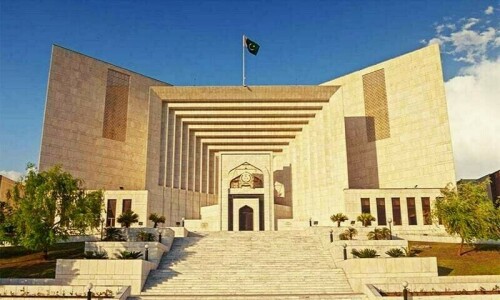While acknowledging the fragile stability achieved so far, many analysts disagree with the official assertion that the next International Monetary Fund (IMF) loan will be the last bailout.
The cause and effect of the current troublesome situation, how it has come to such a pass, and its consequences are well known. Thus the government’s approach to resolving pressing problems falls short of expectations.
The country may be stuck in deep-seated crises with one central issue that has a pervasive adverse impact on the political economy. The top priority must then be to address the principal cause of the various ailments. “The endless cycle of crisis and relief in Pakistan points to a deeper problem: governance,” says Dr Nadeem ul Haque, Vice Chancellor of the Pakistan Institute of Development Economics.
“The government should implement long-term policies”, he suggests, “that can prevent the crises from recurring in the first place.”
“The [IMF] nod to the loan will help the beleaguered Sharif government kick the default can a little further down the road, but constant borrowing is not the solution to the nation’s deep-seated economic woes and structural issues,” say Dawn’s analysts. Nor, they add, does it mean an end to the trials and tribulations of ordinary citizens.
The cost of living crisis is causing social erosion, rampant insecurity, political instability and fear of social turbulence
Seen as a desperate borrower, given the murky state of creditworthiness, Pakistan has struck deals at interest rates ranging from seven per cent to as high as 11pc. A $600 million loan was secured this month from a bank at the highest rate of 11pc. The IMF lending rate for the Extended Fund Facility is 5pc.
On Sept 16, the visiting Asian Development Bank (ADB) President Masatsugu Asakawa assured Pakistan of an $8 billion package — $2bn annually from 2014 to 2027. Pakistan has sought 50pc of the loan in the shape of ADB’s concessional financing, which has a lower rate than that of the IMF.
On the positive side, the State Bank’s recent interest rate cut by 200 basis points will help contain the rupee cost of servicing external debt that eats up 7.5pc of the total revenue, as recorded last year. Analysts say the cost of external debt servicing can be kept under check with a stable local currency’s outlook.
The stability programme depresses domestic demand, stifles economic growth and increases poverty. The cost of living crisis has become the root cause of problems such as social erosion, rampant insecurity, political instability, and fear of social turbulence.
The stability programme depresses domestic demand, stifles economic growth and increases poverty
The government says it wants the country to stand on its feet. No doubt, some efforts are being made in this direction without any meaningful outcome, especially owing to the erratic decision-making of authorities, tardy pace of implementation, and poor service delivery.
In a recent meeting, the Economic Coordination Committee (ECC) spelt out policy guidelines for future project planning and execution.
Sponsoring and executing entities/agencies were directed to ensure that all projects, including foreign-funded ones, are implemented within specified timelines, with clear ownership and lines of accountability to prevent time and cost overruns.
Furthermore, the economic and financial risks associated with foreign-funded projects need to be carefully assessed, as these loans carry exchange rate risks, and repayments can become even more burdensome as the project’s returns are in local currency.
The latest media report indicates that the government will likely scrap the 300 megawatts Gwadar import-coal-fired project to encourage the use of local coal and save foreign exchange. The decision to allow only local coal for power projects was taken some time back.
Planning Minister Ahsan Iqbal also directed all relevant departments to prioritise the completion of the Diamer-Bhasha dam project and avoid further delays to ensure the country’s water and food security. Chairing a review meeting of concerned officials on the progress made so far, the minister noted that the dam project cost has increased significantly due to delays. He regretted that even after six years, the revised PC-1 of the project still needs to be prepared. The dam is designed to provide storage of 6.4m acres feet of water.
In a related development, the Supreme Court has also sought the assistance of legal experts on whether it should continue supervising the accounts opened under its 2018 order to generate funds for the development of the Diamer-Bhasha and Mohmand dams. The funds have swelled to Rs18.6bn, including Rs7.1bn profit earned on the collected amount.
In response to the government and Wapda’s plea, the Supreme Court has to decide whether the executing agency of hydropower generation should be allowed to exclusively utilise the funds created for the construction of the two dams.
After numerous ups and downs — like many other hydropower projects — the Suki Kinari Hydropower project passed its Reliability Run Test on Aug 30. Built by a Chinese company with an investment of $1.7bn and a capacity to supply three billion units per annum of electricity, the dam project is expected to go into commercial production shortly.
Published in Dawn, The Business and Finance Weekly, September 23rd, 2024















































Dear visitor, the comments section is undergoing an overhaul and will return soon.